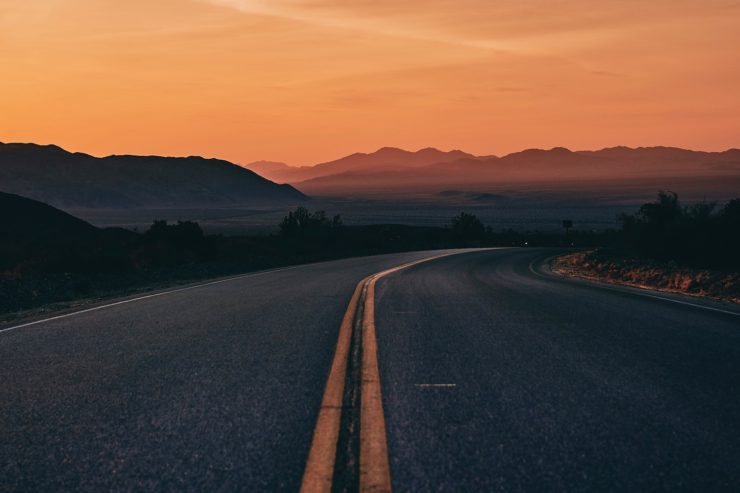To my mind, a road trip is not an exodus or a flight from danger. It can start with one of those things but only transcends to “road trip” status when the danger is over, and the participants are looking for the next thing. Road trips are exploratory and often recreational, more ‘let’s see what’s around the next bend’ and less ‘if we don’t keep moving, we’ll have to eat grandpa.’
Cormac McCarthy’s The Road is not a road trip, nor The Fellowship’s jaunt into Mordor, or Tracker’s search in Black Wolf, Red Leopard by Marlon James. Those are Flights or Quests. Another Quest/Flight book would be Going Bovine by Libba Bray.
Emily St. John Mandel’s Station Eleven hits the road-trip mark better—the Traveling Symphony doesn’t absolutely have to be on the road, but it travels the same path year after year, hitting the same villages, performing for the same people. I’d argue Stephen King’s The Stand is a road-trip novel until the various characters figure which side they’re heading for, then it’s a Quest. Doctor Who is likely the ultimate road-trip series.
A road trip can take a sudden detour, just because, and either come back to the planned route or not. A good road trip is about the people that you meet and the things you see, as Julie Riley, the main character in my Twenty-Five to Life finds out. She’s on the road for a why not a where, and hopefully by book’s end finds her Way.
I love road trips. My spouse and I are particularly good at them and hope to outfit a used minivan soon to make them even better. Here are five books we might take along as inspiration:
The Rolling Stones by Robert A. Heinlein
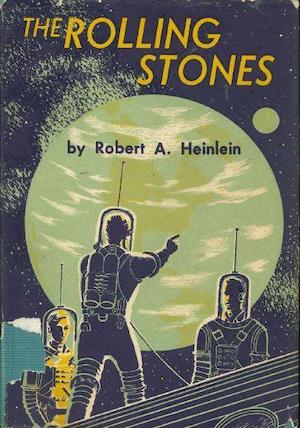
Twin brothers Castor and Pollux rebuild a used spaceship and take Mom, Dad, little brother Buster, and Grandma Hazel (a founding father of Free Luna) on a tour of the solar system. They try to sell used bicycles on Mars, accidently overpopulate their ship with Martian flat cats, and find homes for the critters among the miners of the asteroid belt. At book’s end, the family is headed out Saturn way just to take a look at the rings. Where they’re going, they don’t need roads, but it counts as a road-trip novel.
American Gods by Neil Gaiman
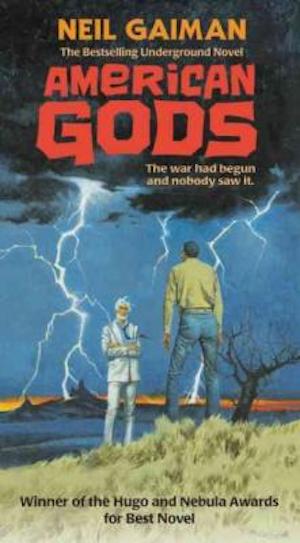
The mysterious Mr. Wednesday has an agenda, but his driver Shadow, an ex-con mourning a dead wife, is just along for the ride… at first. Dig around on the Internet and you can find itineraries and maps made so you can recreate Shadow’s own fumbling journey into godhood, starting with the House on the Rock in Wisconsin to Cairo, Illinois to Lebanon, Kansas to the World Tree near Blacksburg, Virginia to Rock City, Georgia. Be careful, the road is full of ancient conmen, sensitive deities, and leprechauns looking for a fight.
Green Lantern/Green Arrow by DC Comics
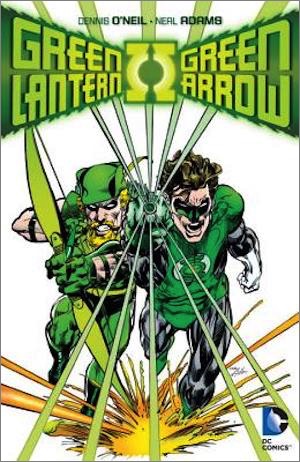
I picked up a lot of the singles during my comic-pursuing days, but you can get them as bound collections now. In the very early ‘70s, DC Comics Dennis O’Neill and Neal Adams put Hal Jordan, interstellar ring-bearing cop, into a pickup truck with Oliver Queen, counterculture archer, and sent them on a road trip into America. The duo experienced the country as they took on racism, sexism, poverty, over-population, pollution, demagoguery, and Speedy’s (Green Arrow’s protégé) heroin addiction in the days of the Nixon White House.
Ariel by Steven R. Boyett

A boy and his unicorn. Set some years after the apocalyptic Change that killed or disappeared 99 percent of humanity, a dude named Pete is wandering the American southeast just trying to stay alive when he meets a young unicorn who he can only touch because he’s a…you know. He names her Ariel, teaches her how to talk, and they become the best of friends and wander together. When the two learn there’s price on Ariel’s horn they head to Manhattan (the book changes from Road Trip to Quest) to take on an evil sorcerer. Pete meets a girl along the way, which presents its own set of problems. Sex or your best pal?
Mongrels by Stephen Graham Jones
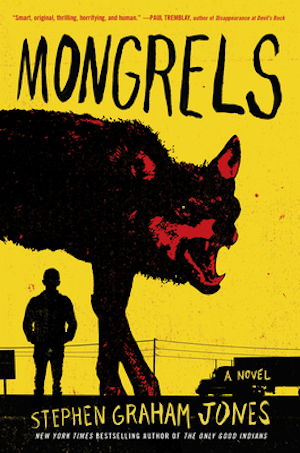
A family of werewolves lives a nomadic life in the American south, avoiding contact with a world that hates and fears them. The main character, a teen, hasn’t done the change-into-a-wolf thing yet, and uses his travel time to write a manual on werewolf life, which includes such useful tidbits as ‘empty the trash before you change, because some garbage is not digestible.’ Excellent book. I can’t recall if I ordered this list one-to-five best or five-to-one best, but Mongrels is up there somewhere.
***
Runners up: Taran Wanderer by Lloyd Alexander, any Star Trek: Voyager novel, 2312 by Kim Stanley Robinson, and the Saga comic by Brian K. Vaughan and Fiona Staples.
Buy the Book
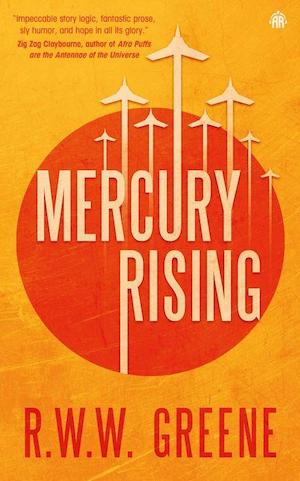

Mercury Rising
Originally published October 2021.
R.W.W. Greene is a New Hampshire USA writer with an MA in Fine Arts, which he exorcises in dive bars and coffee shops. He is a frequent panelist at the Boskone Science Fiction and Fantasy Convention in Boston, and his work has been in Stupefying Stories, Daily Science Fiction, New Myths, and Jersey Devil Press, among others. Greene is a past board member of the New Hampshire Writers’ Project. He keeps bees, collects typewriters, and lives with writer/artist spouse Brenda and two cats. He is is the author of The Light Years (2020) and Twenty-Five to Life (2021), both with Angry Robot Books, and shares too much on Twitter at @rwwgreene.










